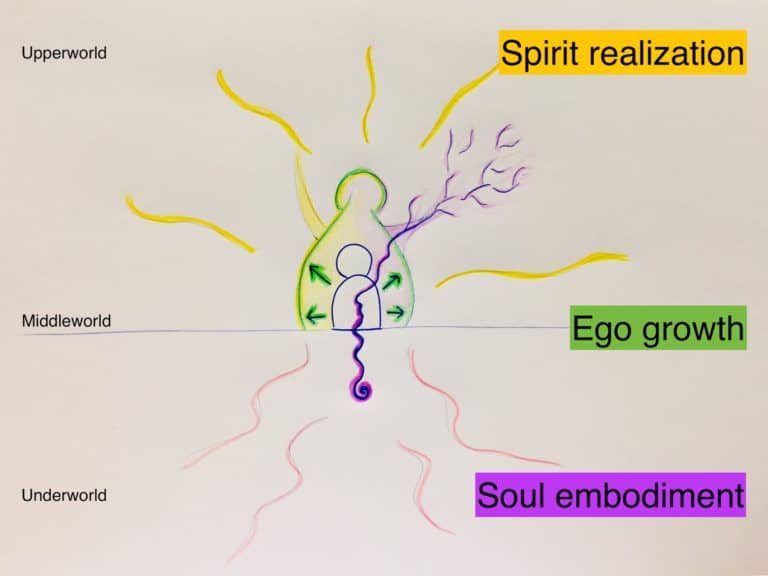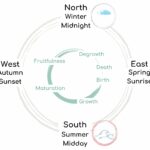Wild Coaching
The three kingdoms of personal development: Ego, Soul and Spirit
Three kingdoms of personal development:Ego, Soul and Spirit
The lifelong journey of becoming whole
Becoming “whole” is a process during which we are called to developing different qualities and gaining insights about ourselves. Bill Plotkin’s description of the three realms of personal development helps to map various personal development practices, perceive how they relate to each other and which function they can play in our lifelong personal development process.
Ego growth: healing and growing the everyday personality
Bill Plotkin uses the word Ego to describe the part of our personality that is active in our everyday life, which he also calls the “middle-world”. By feeling, thinking, sensing, and imagining the Ego allows us to satisfy our basic needs and take care of our body. Thanks to a mature Ego we develop healthy relationships with ourselves, with each other and are able to express our creativity.
The Ego described by Plotkin is constituted by different subpersonalities which, in their own way, are there to protect us and guide our behaviors. During our childhood each of us had some challenging experiences in which we were emotionally harmed. By looking at the roles our subpersonalities have taken up in order to protect us and checking if they are still serving us in our adult lives, we can reframe their functions and by doing so gain more degrees of freedom in our way to be in the World during our adulthood.
Developing a healthy Ego is a work that never ends and which builds the foundation for the embodiment of soul and realization of spirit, the two realms through which we can access our life’s purpose and deeper longings.
Soul embodiment: sharing our unique gifts
Plotkin uses the word Soul to describe the unique and essential qualities each of us has in its core, our unique fingerprints, we are here to share. Exploring them is a journey of “descent into the underworld”, the mysterious realm lying below everyday’s life. It’s an adventure into places of our psyche unfamiliar to our Ego’s subpersonalities and normal way of functioning.
By descending in the underworld we can identify our unique gifts and find guidance on how to bring them into the world and by doing so serve the life community we belong to. When we embody our soul we feel connected with our “raison d’etre”, our heartfelt purpose, and gain a deep sense of meaning and belonging.
If we surrender to Earth’s intelligence, we could rise rooted like trees.
Rainer Maria Rilke
Spirit realization: being one with all
With the word Spirit Bill Plotkin refers to the quality we all have in common, our shared membership of the cosmos. He uses it to describe the mysterious quality that permeates and animates everything in the universe and transcends it. Spirit realization is an “ascent” journey towards the “upper world”. The aim of this journey is to experience a sense of peace, freedom, and connection with everything. Through the ascent journey we can experience presence, bliss, or a sense of enlightenment.
Developing a healthy Ego is the fundation from which we can move "up" and "in"
Practices that support Ego development help to create the foundation for a healthy, mature adulthood. From this foundation skills and capacities from the underworld as well as from the upperworld can be developed in order to access a sense of peace and compassion, while also finding our place in the World and expressing our unique qualities. These two journeys mutually reinforce each other in our process of maturing and living our purpose. For instance, having a calm mind helps us to hear the calling rising from our inner depths, and when we express our gifts, we feel fully present and one with all.
Below is a summary of some practices Plotkin listed in his book Soul Craft, Crossing into the Mysteries of Nature and Psyche. The list is not complete, and its aim is to provide an overview with some ideas.

Summary of Ego, Soul and Spirit functions and practices
Ego Growth
Function: Personal wellbeing
Gateway to access: Imagination, intuition, ability to feel, sense and think
Practices to cultivate it: Healing emotional wounds, development of personal bonds, physical grace, emotional expression, blossoming empathy, intimacy, authenticity, etc.
Disciplines supporting its development: Psychotherapy, coaching, art/movement therapy, bodywork
Soul Embodiment
Function: Discovering our particular place in the world and the way to serve our community.
Gateway to access: Sense of purpose, meaning, direction
Practices to cultivate it: Soulcraft practices as
wandering in nature, conversing with non-human beings, deep imaginary journeys, self-designed ceremonies, traditional rituals, etc.
Disciplines supporting its development: Soul-centered coaching, mystery schools, trance dancing, council work, storytelling, symbolic artwork, soul-poetry, shadow work, etc. depth psychologists like Carl Jung, James Hilman, Shamanism
Spirit Realization
Function: Surrender the attachment to individuality (Ego and Soul), merging with the eternal
Gateway to access: Quiet mind, peace, centredness, presence
Practices to cultivate it: Meditation, yoga, prayer, contemplation, etc.
Disciplines supporting its development: Religious traditions as Buddhism, Zen, Christianity, Islam, Hinduism, authors like Ken Wilder, Eckart Tolle
From the Ego, Spirit and Soul kingdoms to Bill Plotkin’s developmental maps
Bill Plotkin developed more detailed maps, like the eight phases of a healthy eco-centric human development described in “Nature and the Human Soul” that reveal how fully and creatively we can mature when soul and wild nature guide us. Or like the four quadrants of the Ego and its subpersonalities described in “Wild Mind, a field guide to the human psyche”. These maps can be helpful to gain further orientation about which skills and qualities, we did not sufficiently develop in our life and we may want to catch up with, as well as for gaining insights on which stage of our lifelong maturation journey we are in and what are the callings and developmental tasks of this life phase.
If you are curious about learning more details I highly recommend you to read or listen to Bill Plotkin’s audiobooks. And if you would like to reflect on your personal journey I would be happy to have a conversation with you. You are welcome to get in touch.
Some food for thought:
- How does the writing resonate with you? Towards which ideas do you feel repulsion or attraction?
- To which development kingdom do you feel attracted to? Which one are you already exploring?




